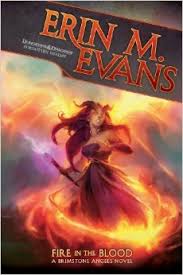EXCLUSIVE – Erin M. Evans Interview: ‘Fire in the Blood’ by Alfred Cloutier
Published By: Battleground Games Hobbies on January 14th, 2015
Erin M. Evans Interview: Fire in the Blood
by Alfred O. Cloutier
Alfred O. Cloutier was able to sit down with award-winning author Erin M. Evans, writer of Fire in the Blood, the third book in the Forgotten Realms series Sundering.
In Fire in the Blood Erin M. Evans continues the riveting tale of her Sundering character, Farideh, as she becomes embroiled in a Forgotten Realms-flavored game of thrones.
In a direct follow-up to the third book in the Sundering series, The Adversary, young warlock Farideh falls into the midst of a battle for the throne of Cormyr. As the war brought on by the Sundering rages across Faerûn, princes and princesses, wizards and rogues scheme to capture the seat of power of the Land of the Purple Dragon—with Farideh and her allies caught squarely in the middle.
What is Farideh up to?
In Fire in the Blood, Farideh travels to the Forest Kingdom of Cormyr, home of her sister’s lover, Brin. Brin’s been in the series since the beginning, and this is the book where you meet his family and unravel his conflicts—beginning with an unwanted engagement to the princess of Cormyr and a brewing succession crisis. Alongside that, you have Farideh coping with the realization that she’s a Chosen of Asmodeus, the god of sin, and trying to figure out where she stands with Lorcan. And then all Hell breaks loose.
Is there any relation between the Dragon Throne and The Wyrmskull Throne?
None at all. The Dragon Throne is a nickname for the throne of Cormyr. Before it was settled by humans, Cormyr was ruled by the Purple Dragon, Thauglorimorgorus.
Does Fire in the Blood pick up where The Adversary left off?
It picks up around a month later, when the party has settled into life in Cormyr (for various values of “settled”).
Have you been playing the new edition of D&D? What do you think of it?
In my game we just converted from the play test rules, but we’ve been having a lot of fun! I’m playing a paladin, instead of my usual spellcaster, so I can’t compare directly—but I’ve been really excited and pleased by the direction things are heading. The emphasis on making the game your own is wonderful.
Last time we corresponded, you mentioned you played at the Extra Life fundraising event (for Children’s Miracle Network Hospitals). Do you plan to play again this year? Who will you play as?
I will indeed! On October 25th, I’ll be participating in a day of gaming through Extra Life, raising money for Seattle Children’s Hospital. Donations help decide what kind of character I’m going to play—what benefits, what equipment, and—this year—even who. Each donation buys you votes: you can choose from an assortment of characters who appear in my novels. (Check out more information here).
OK, your blog is called SlushLush.com – what’s up with that?
Well, once upon a time I was an intern for a small press, with another woman. One of our jobs was acquisitions—we read the slush pile. For those of you who don’t know, “slush” is unsolicited manuscripts, the book proposals aspiring authors without agents send in. I love reading slush. It’s inspiring and funny and really exciting when you find something you want to buy in there. I was so enthusiastic, the editor suggested we start a blog about slush-reading. So “Slush Lush” was my nom de plume for that endeavor (which never quite came together) and I took it for the name of my blog.
Have you ever had a problem incorporating some story element dictated by another author’s work in the Forgotten Realms shared world?
Fire in the Blood overlaps with Troy Denning’s Sundering novel, The Sentinel. When I was writing my first draft, he was wrapping up his final. The descriptions of the army that attacks Marsember didn’t quite line up with what I was expecting—or what I had written already. At first, you panic—there is no way to fix this except a total rewrite! But it ends up pushing you to think of clever solutions. In my case, it’s sort of a surprise, but it tidied up a couple of minor lore questions and helped characterize Raedra, Cormyr, and Shade all at once.
Who is the master of continuity for Forgotten Realms – Ed Greenwood, or someone else? I would imagine that to be a tough job that only goes noticed when something is off…
To an extent, everyone is. Matt Sernett is the official Wizards of the Coast world person. He’s the one you go to when you need to know everything there is printed about the Royal Magician or Azoun V or what have you. Ed Greenwood on the other hand is good for questions like “Is there a kind of wood that you could get in this place that would be attractive to carve and okay being left out in the elements?” The open-ended stuff is where Ed is invaluable. Susan J. Morris is my editor, and she’s a veritable encyclopedia of obscure D&D details. And in between, it’s good to follow the path through more specific experts—Brian Cortijo is a designer and expert on Cormyr, who created several of the characters I used for Dragon articles. Troy Denning described Marsember (a nearby city) in the same war. You want to make sure you get the best batch of information you can.
Do you get demographic information on who is reading your books? Who would you like to have reading your books?
The closest I’ve gotten is the breakdown on who follows me on Facebook and Twitter. (Facebook says I’m very big in Jacksonville!). The majority of my readers are adult men, but I think that’s partly because those are the readers the Forgotten Realms has always been primarily aimed at. Beyond that lays the Fog of Marketing
To be honest, I don’t like demographic marketing—I get the purpose of it, but it always seems to leave someone out in the cold. The people I want reading my book are the people who will enjoy it. I’m gratified to hear from hardcore Realmsfans who love them, from fantasy readers who were surprised and delighted by them, from men who hooked their wives and girlfriends on the Realms with them—and from women who got their partners reading the books.
How was the response to The Adversary?
Very good!
If you were writing outside the umbrella of Wizards, what kind of stories would you write? Would you insert any allegory, or roam into more mature language and situations?
To me, the setting doesn’t have the kind of limitations people usually assume. I love allegory—The Adversary is about coping with depression and the way relationships and connections provide support for us in our darkest hours. How do you weather than and how does it shape you. How do you learn to trust yourself again.
It’s also about fighting the scary shadow-goddess of loss over people with magical powers. It can be both. It should be both. I don’t even know how to write these books without thinking about both!
I do wish sometimes I could drop an f-bomb. That’s about the only thing I’m not allowed to do, but that’s more the setting than anything. So far as “adult situations” and violence are concerned, I think I go as far as I want—especially in Fire in the Blood.
Do you visit exotic locations, or even museums to get inspiration for stories, or story details?
Since the books I’m writing right now aren’t set anywhere real, I tend to pick up details as they cross my path. The most exotic location I ever snagged a book detail from didn’t even involve leaving the country: the plaguechanged tree that forms the Ashmadai grove in Brimstone Angels was inspired by the banyan tree in Lahaina, HI.
About Erin M. Evans
ERIN M. EVANS got a degree in Anthropology from Washington University in St. Louis–and promptly stuck it in a box. Nowadays she uses that knowledge of bones, mythology, and social constructions to flesh out fantasy worlds. She is the author of The God Catcher, and she lives in Washington State.
About Alfred O. Cloutier
Alfred O. Cloutier has contributed to Dragon Magazine, and has edited for a number of other gaming publishers. He can be found here, on Facebook.
Are you a fan of Erin M. Evans, Forgotten Realms or Fire in the Blood? Buy this book by clicking here or the link below!






Social: